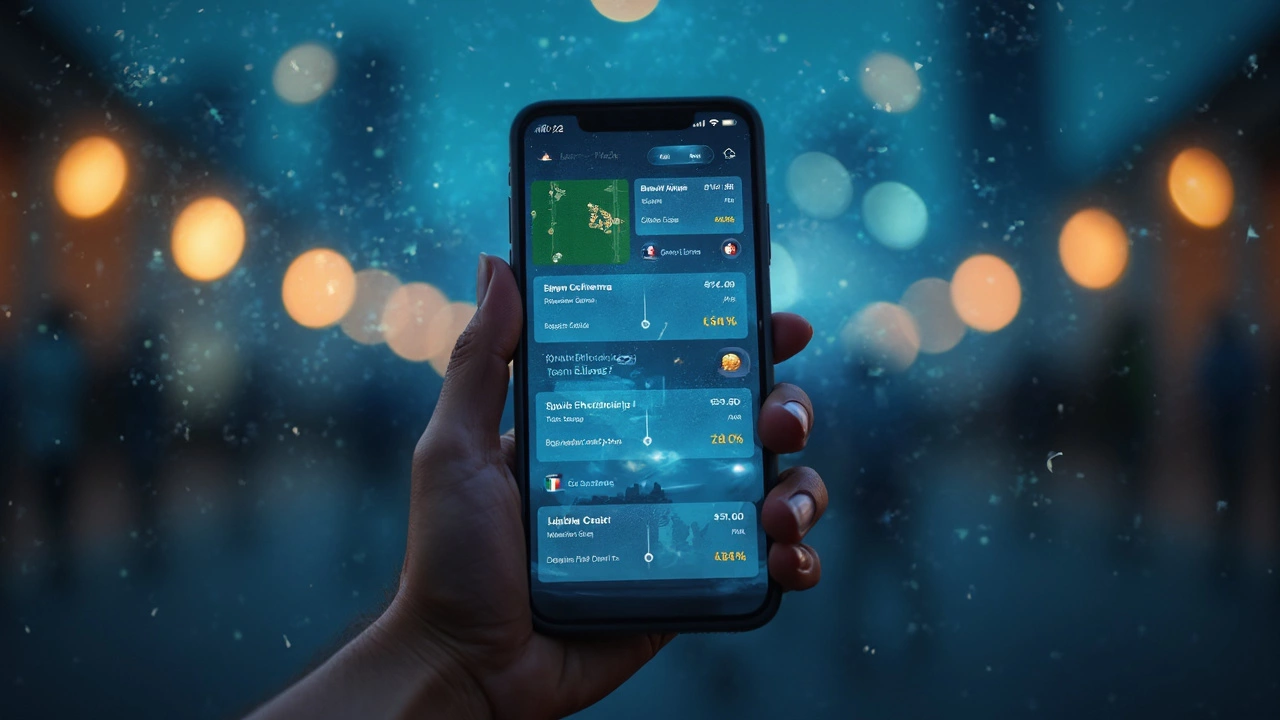Ever looked at a match result and wondered how things really played out? There’s a world of difference between a 1-0 win where your team dominated and another where they scraped by. That’s where livescore stats step in. Instead of just glancing at goals, you get details like total shots, possession percentages, passing accuracy, and even expected goals (xG)—stuff that really spills the truth about a team’s performance.
If you’re following games on the livescore site or checking updates on your livescore app, all this data sits ready to be explored. It’s not just for data geeks either—any regular fan can pick up trends, figure out which players are hot, and even spot weaknesses before the commentators do. And if you’re into betting, diving into the numbers beats making guesses based on old-school hunches or rival banter.
Why Livescore Stats Change the Game
Back in the day, sports fans had to wait for the next day’s paper for match stats—or if you were lucky, catch a few highlights on TV. Now, using livescore stats, you get real-time info that goes so much deeper than just the numbers on the scoreboard. That isn’t just handy for die-hard fans. It’s a game-changer whether you play fantasy leagues, bet smart, or just want a real feel for your team’s form.
On the livescore site or app, stats update live as the action unfolds. No more guessing who dominated: you can track who had more possession, who pressed with more intent, and which keeper worked harder. Here’s a basic breakdown of the core stats you’ll see, and what each tells you:
| Stat |
What It Shows |
| Shots on Target |
How threatening a team actually was going forward |
| Possession % |
Who’s controling the tempo and flow of the game |
| Pass Accuracy |
If a team can keep the ball moving under pressure |
| Expected Goals (xG) |
Quality of chances, not just the final result |
| Fouls / Cards |
Aggression or defensive struggles |
This kind of detailed view matters a lot. For example, a team could win 1-0, but if their opponent had way more shots on target, the score might not reflect how close or one-sided the match was. These extra details, found easily with livescore stats, help you cut through bias or drama and see what really happened on the pitch.
Livescore stats also let you compare past and present performances. If you’re following livescore football, it’s simple to see how your club’s pressing has dipped or if their passing got sloppier over time. Team analysts and casual fans alike can spot trends or even call out surprises before anyone else.
Bottom line: with livescore stats updating in real time, you’re never left in the dark. You can see stories unfold as they happen—not just the headline number, but the true flow of the game underneath.
Going Beyond the Score: What Data Can You Track?
If you think scoreboards tell the whole story, you're missing out. On the livescore stats pages, you’ll find info that makes clear why a match ended the way it did. It’s not just about the final score—fans and punters can check out how teams and players actually performed minute by minute.
What kind of data are we talking about? Here’s what you’ll spot right away when you dig into a match:
- Shots on/off target: Find out if a striker is sending rockets or missing sitters. A team with 20 shots but no goals? Bad luck or bad finishing.
- Possession share: See who’s bossing the game—was it nonstop pressure or just a late counter?
- Corners and fouls: More corners might mean more attacking, while foul counts show if things got heated or messy in midfield.
- Passes completed: Teams with high pass numbers usually control the tempo (think Man City or Barca style).
- Expected Goals (xG): xG basically sums up the quality of the chances. High xG and no goals? The striker’s having a rough day.
- Cards (yellow/red): Useful if you’re tracking suspensions or want to see if a team’s losing discipline.
- Player ratings and stats: Some livescore apps show player-level numbers like tackles, dribbles, key passes, and saves.
To spell it out, here’s what you might see in a typical football match breakdown on livescore site or mobile app:
| Stat |
Home |
Away |
| Shots (on target) |
15 (7) |
9 (3) |
| Possession % |
63% |
37% |
| Corners |
10 |
4 |
| Fouls |
12 |
15 |
| Yellow/Red Cards |
2/0 |
3/1 |
| Expected Goals (xG) |
2.10 |
0.95 |
See how the numbers can tell you at a glance who dominated and who just survived? This kind of detail matters for both serious analysis and friendly debates!
And it’s not just football—livescore stats for other sports (like tennis or basketball) show things like aces, double faults, rebounds, turnovers, and more. You can track almost every key moment without having to watch the entire game.

How to Use Advanced Stats for Smarter Analysis
Most fans stick to the basics—goals, assists, final scores. But if you want to outsmart the crowd, it all starts with advanced livescore stats. These numbers reveal what's really happening on the pitch way beyond the scoreboard. For example, shots on target and xG (expected goals) show you if a team is on fire or just getting lucky. Possession tells you who’s running the midfield. You don’t need a sports science degree—just look for patterns and trends.
Here’s how you can dig deeper:
- Compare shots with goals: If a team fires 15 shots but nets just once, they might struggle to finish. That’s a red flag for next week’s fixture.
- Check xG over time: Teams with consistently high xG usually score more in the long run, even if they’re having a dry spell now. That’s useful for fantasy picks and betting.
- Analyze passing maps and accuracy: Good passing means control. Low passing accuracy under pressure could spell trouble against stronger teams.
- Study player stats: Defenders with lots of clearances or attackers creating big chances are worth watching, especially if you play fantasy games or like prop bets.
- Watch for streaks: If a team keeps dominating possession but can’t win, maybe their forwards are off form, or their finishing needs work. Spotting this could give you an edge when looking at livescore betting odds.
Let’s see what this looks like with real match stats from the livescore site:
| Stat | Team A | Team B |
|---|
| Shots (on target) | 15 (7) | 8 (3) |
| Expected Goals (xG) | 2.1 | 0.9 |
| Possession (%) | 63 | 37 |
| Passing Accuracy (%) | 88 | 81 |
At first glance, Team A and Team B might look close. But with advanced stats, you see Team A dominated possession, created more chances, and had a much higher xG. Even if the final score was tight, data like this proves who’s really on top.
Quick tip: On the livescore app, tap the stats tab during live games to view these numbers in real time. You’ll see trends before the TV pundits catch on. And since livescore stats update instantly, you’re always one step ahead for making bets, picking fantasy squads, or just winning bragging rights at work.
Making the Most of Livescore Site, Mobile, and App
If you want info that’s fast and detailed, you’ve got three main choices: the livescore site, livescore mobile, or the livescore app. Each of these options gives you access to a full stack of livescore stats, plus all the game updates you could ask for, but they cater to slightly different styles.
The desktop livescore site is ideal if you want to dig deep into numbers. Full-screen tables, sortable columns, and fewer layout compromises make it great for checking the whole weekend’s fixtures, flipping between leagues, or analyzing tables. You can even compare different teams’ stats side-by-side for each round. For example, check out this simple comparison—the sort of thing that’s smooth on desktop:
| Team |
Shots on Target |
xG (Expected Goals) |
Pass Accuracy (%) |
| City United |
9 |
2.3 |
89% |
| Lakes FC |
4 |
0.8 |
77% |
When you’re out and about, the livescore mobile experience steps in. Whether you use the mobile site or download the livescore app, you’ll get speedy access and push notifications. One tap takes you to your favorite team’s stats or today’s matches. Personalize it with alerts for kick-off, goals, red cards, or just the final whistle if you’re low on battery.
- Livescore app: Best for real-time push notifications and easy navigation. You can even set up custom favorites and track different sports like livescore football or livescore tennis without switching apps.
- Livescore mobile site: Doesn’t require a download, but still pretty slick. It’s handy if you’re on a friend’s phone or trying to save space.
Pro tip: If you register for a livescore login, you can save preferences and sync across devices. No need to redo your favorite leagues or teams when you switch from your laptop to your phone.
The app and mobile site also offer a bonus—livescore alerts for in-play odds and key stat changes, which are clutch for betting fans or just for bragging rights with your friends. Livescore’s sports coverage keeps expanding too, so you get world leagues and even niche tournaments.
Bottom line, whether you like a big screen for deep dives or a pocket solution for quick checks, Livescore fits both. Just figure out your main goal—live alerts, in-depth stats, or fixture planning—and pick your tool. You’ll spend less time hunting info and more time actually following the games that matter.

Tips: Spotting Trends and Avoiding Common Misreads
Getting the most out of livescore stats means looking past the basics and not falling for numbers that don't tell the whole story. For example, some fans see a high possession stat and assume a team dominated, but that's not always true. It's more about what a team does with the ball, not just how long they keep it.
You’ll want to check more than one stat before making a call. If a striker had five shots but four were blocked outside the box, it’s not the same as five shots from inside the six-yard area. Look at stats like expected goals (xG), key passes, and shot locations for a clearer picture.
"Stats are meaningful when you put them in context. A team with low xG but a high score probably got lucky, and that rarely lasts," says football analyst Michael Cox for The Athletic.
Here are some things to keep an eye on when digging into livescore stats:
- Combine stats, don’t cherry-pick: If you only check one number like corners or shots, you’ll miss the bigger picture.
- Watch for outliers: A freak 4-4 draw doesn’t mean both teams score buckets every week. Spot the pattern, not the one-day fireworks.
- Consider opponent quality: Stats racked up against weak teams might not mean much going into a tougher fixture.
- Don’t trust one trend too soon: Trends need a handful of games to mean anything. Jumping on a “new” stat after one match is risky.
- Use tables to track trends yourself: Plug team stats into a simple table over five or ten matches, and see what jumps out.
Here’s a simple table to show how you might track trend stats from livescore football over five games:
| Date | Opponent | Goals | Total Shots | xG | Possession (%) |
|---|
| 2025-05-18 | Rangers | 2 | 12 | 1.8 | 58 |
| 2025-05-25 | Celtic | 1 | 7 | 0.7 | 44 |
| 2025-05-30 | Aberdeen | 3 | 15 | 2.3 | 63 |
| 2025-06-03 | St. Mirren | 2 | 11 | 1.5 | 54 |
| 2025-06-09 | Dundee FC | 0 | 9 | 0.6 | 49 |
Notice how the numbers bounce depending on the opponent? That’s why it helps to check the matchups as well as the raw figures. And don’t let one blowout or fluke win throw you off—zoom out and see what happens over a bunch of fixtures.
Bottom line: Stay curious, check context, and never take stats at face value. That’s how you turn livescore stats into real insight, whether you’re chatting in a group, prepping for a fantasy draft, or thinking about a cheeky little bet.








Write a comment